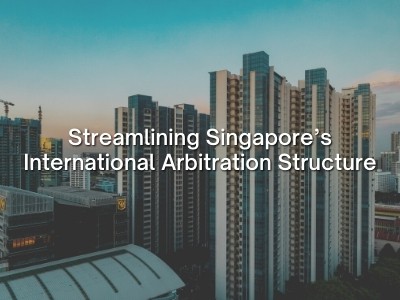Streamlining Singapore’s International Arbitration Structure – The Amendments
Amendments to the International Arbitration Act seeks to firmly entrench Singapore as the preferred location for international arbitration.
The latest amendments to the International Arbitration Act have made essential changes that will further facilitate and streamline the arbitration process. According to Mr Edwin Tong, second Minister for Law, these changes will uphold Singapore’s appeal as an international arbitration location. He further stated that the overall amendments would work to reinforce Singapore’s international arbitration structure.
Primarily the amendments address dispute resolution and confidentiality obligations. In the event of a dispute involving more than two parties, a default procedure for the appointment of arbitrators has been outlined. The amendments also empower the High Court and arbitral tribunals to enforce parties’ confidentially obligations.
Mr Tong clarified these changes by stating that the default process is aimed at reducing potential delays that occur in the arbitration proceedings. The process would be pertinent in the event of multi-party disputes where joint nomination or third-party arbitrators cannot be settled upon amicably. In such an instance, any of the relevant parties may request the appointment of an arbitrator by the assigning authority.
Mr Tong further reiterated the importance of confidentiality in arbitration. Sanctioning the High Court and arbitral tribunals with the power to enforce confidentiality obligations on parties would uphold this axiom. The amendments provide the High Court and arbitral tribunal a legal basis for the enforcement of confidentiality obligations. They may order or direct parties to observe their confidentiality obligations as required by their duty to do so.
These two implemented changes are amongst four primary proposals that were under consideration by the Ministry of Law. For the past year, the Ministry has been in consultation with various stakeholders as to the viability of these proposals. The remaining two proposals are still awaiting approval. One of it is a proposal to allow parties to an arbitration to agree to waive or limit grounds for annulment. The other proposal will enable parties to an arbitration to raise questions of law in the High Court with regards to the arbitral award.
The Implementation
Overall, the responses to the approved amendments to the International Arbitration Act were extremely positive and welcoming. Member of Parliament (MP) for Pioneer SM, Mr Patrick Tay commented upon the far-reaching consequences of Covid-19 on global economies. Mr Tay observed that fall-out of the pandemic is that contractual obligations had a greater potential for disputes due to termination, suspension and restructuring.
However, there have been calls for the other two proposals to be implemented as well. MP for Sembawang GRC Mr Vikram Nair, MP for Nee Soon GRC Mr Louis Ng and MP for Chua Chu Kang GRC Mr Zhulkarnain Abdul Rahim have voiced their concerns to the Ministry of Law. Mr Zhulkarnain specifically called for the urgent tabling of these proposals as he stated that Singapore is facing a lot of competition to the claim of being an international venue for arbitration.
Mr Tong advised caution, stating that these proposals were still under scrutiny. He said that the ongoing process would of necessity take some time as end considerations had to be taken into account. These included developments in the law as well as international conventions and best practices which needed to be balanced against what users want to see. Mr Tong made it clear that making Singapore an ideal international venue for arbitration would be a continuing concern for all.









